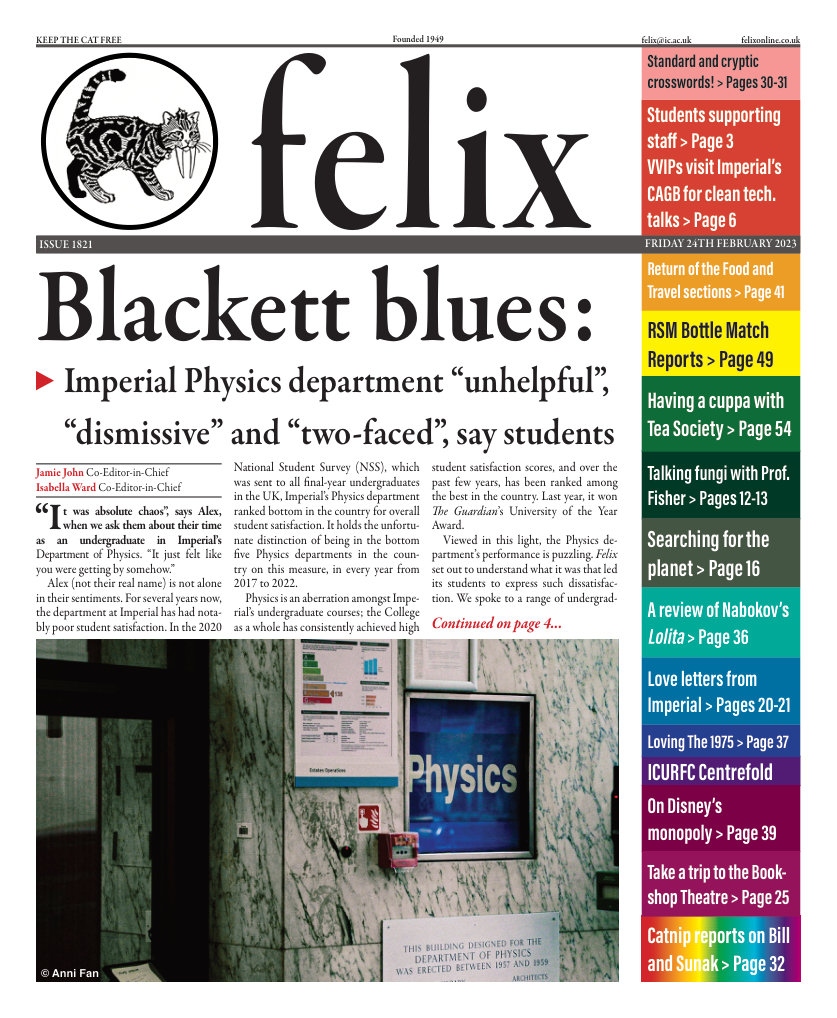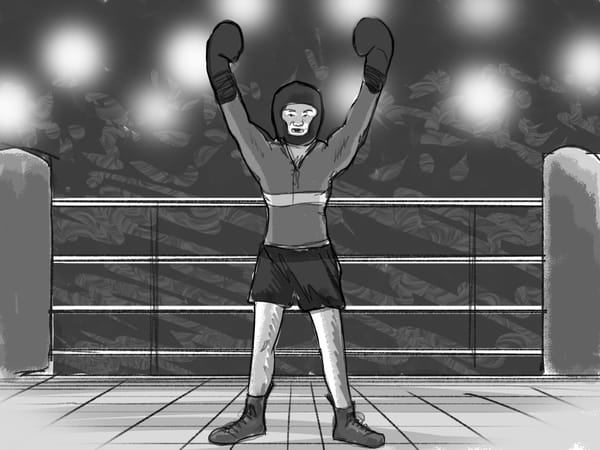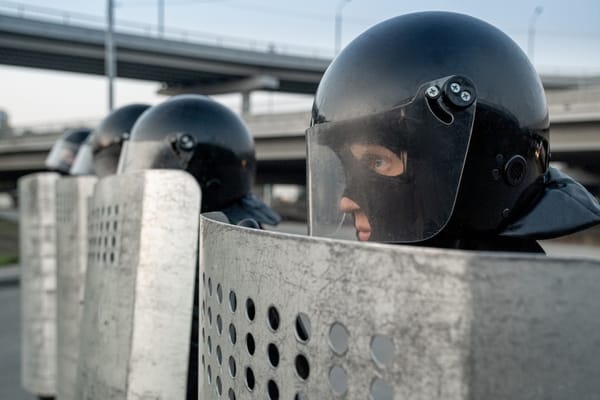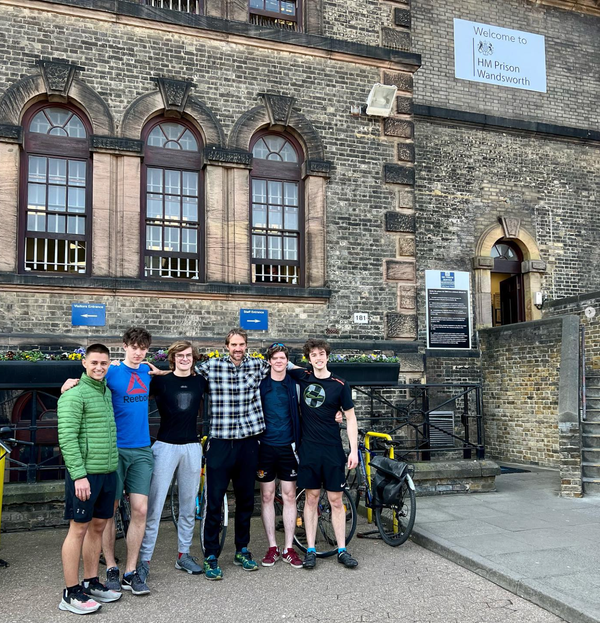The continuing saga of the famous women's rugby team
As Women's Rugby go from strength to strength, Felix looks back on the sport's rich history at Imperial.
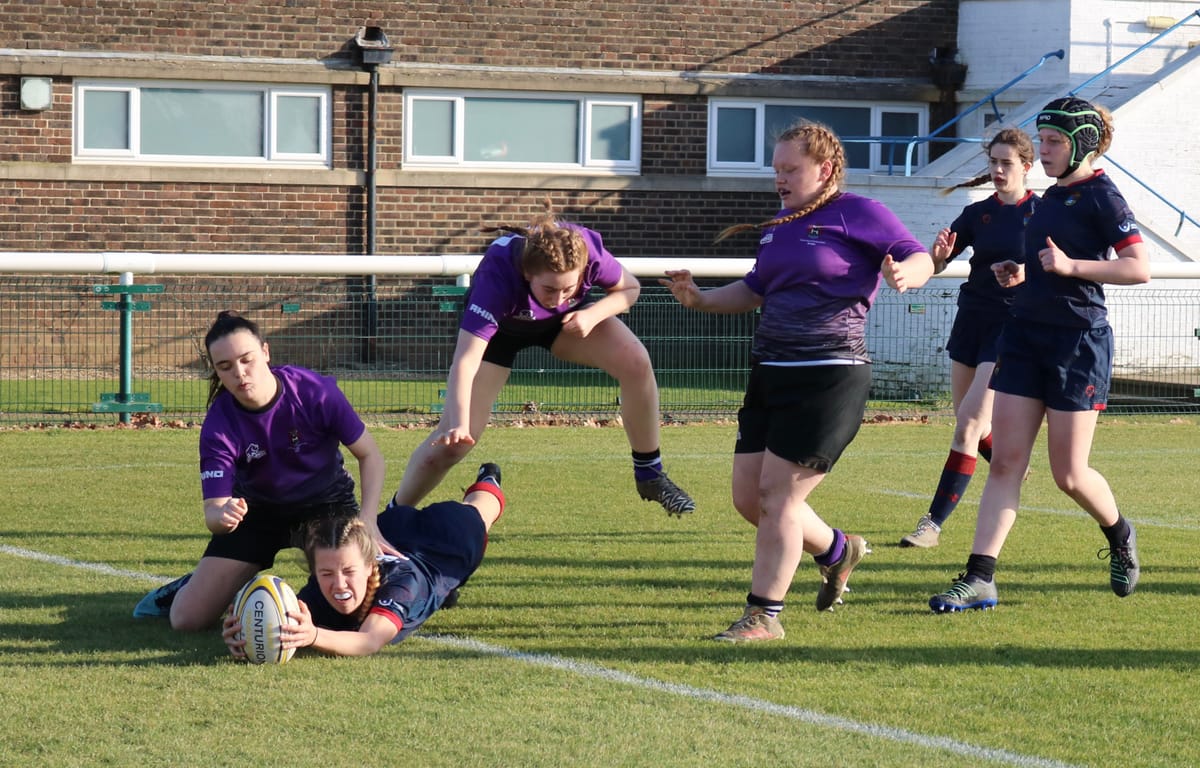
The Imperial College Women’s Rugby Club (ICUWRFC) are flying high. As the season winds down, they remain undefeated, and will likely be promoted for next year. They are now looking forward to showing off their impressive gameplay at the City Varsity (TCV), their exhibition match against LSE.
But it’s not only recently that they have gotten into their stride – Imperial College was a founding member of the Women’s Rugby Football Union in 1983. By that point, the Imperial Ladies’ Rugby team was already well seasoned, having established themself as a competitive team throughout the late 1970s.
In 1980 the team became of particular interest, when their game against University College London (played at Harlington) was filmed by the BBC for the news programme Nationwide and the team was featured by the Evening News and The Sun. Felix wrote that the team had even sparked the interest of the BBC World Service.
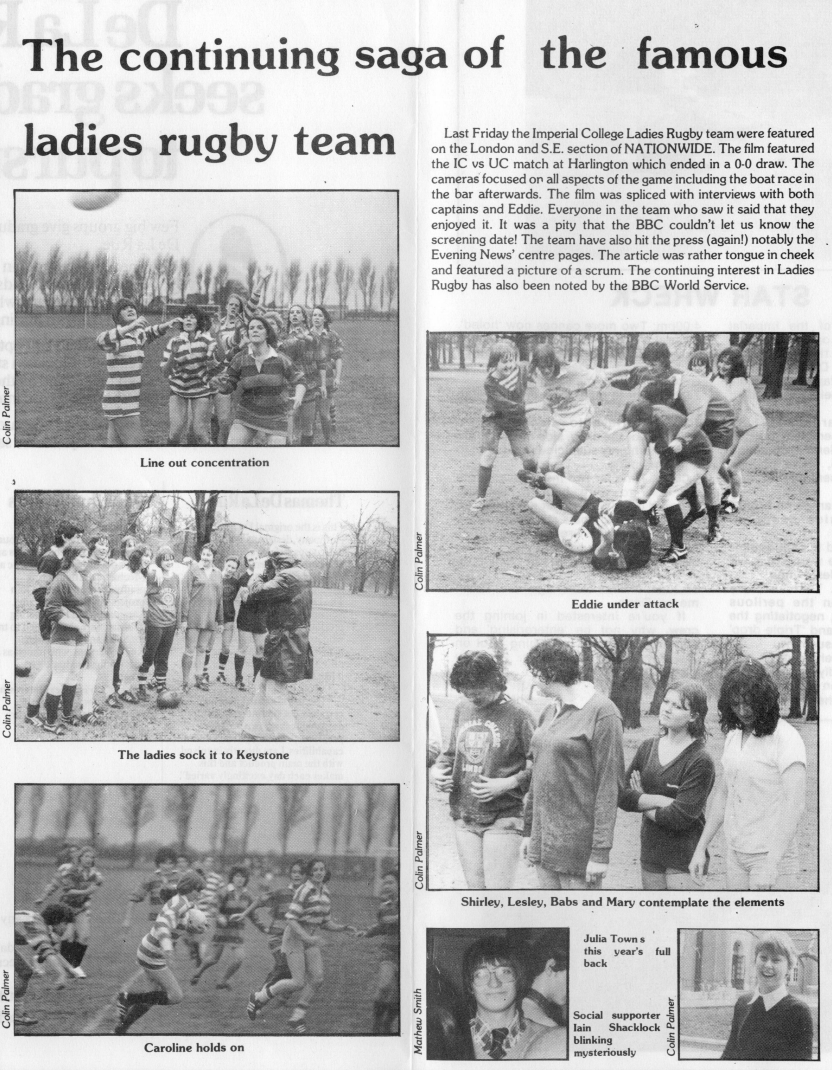
The team were also featured, but less favourably, in the Daily Express, in an article which Felix later apologised had “trivialised” the team. This is of no surprise to ICUWRFC Club Captain Martha, who, 40 years on, still feels that women’s rugby is not taken seriously. She tells Felix “Lots of people don’t really think it’s a proper sport,” saying there is a tendency to view the team as “childlike” and that “we get talked down to; people say things like ‘do you know the rules?’” It’s chilling to see little has changed since the Daily Express article, which incorrectly writes “the girls are still learning the rules”, although Martha notes that they now explicitly ask coaches to not call them “girls” as not only is this demeaning, but it would actually refer to under-18s rugby
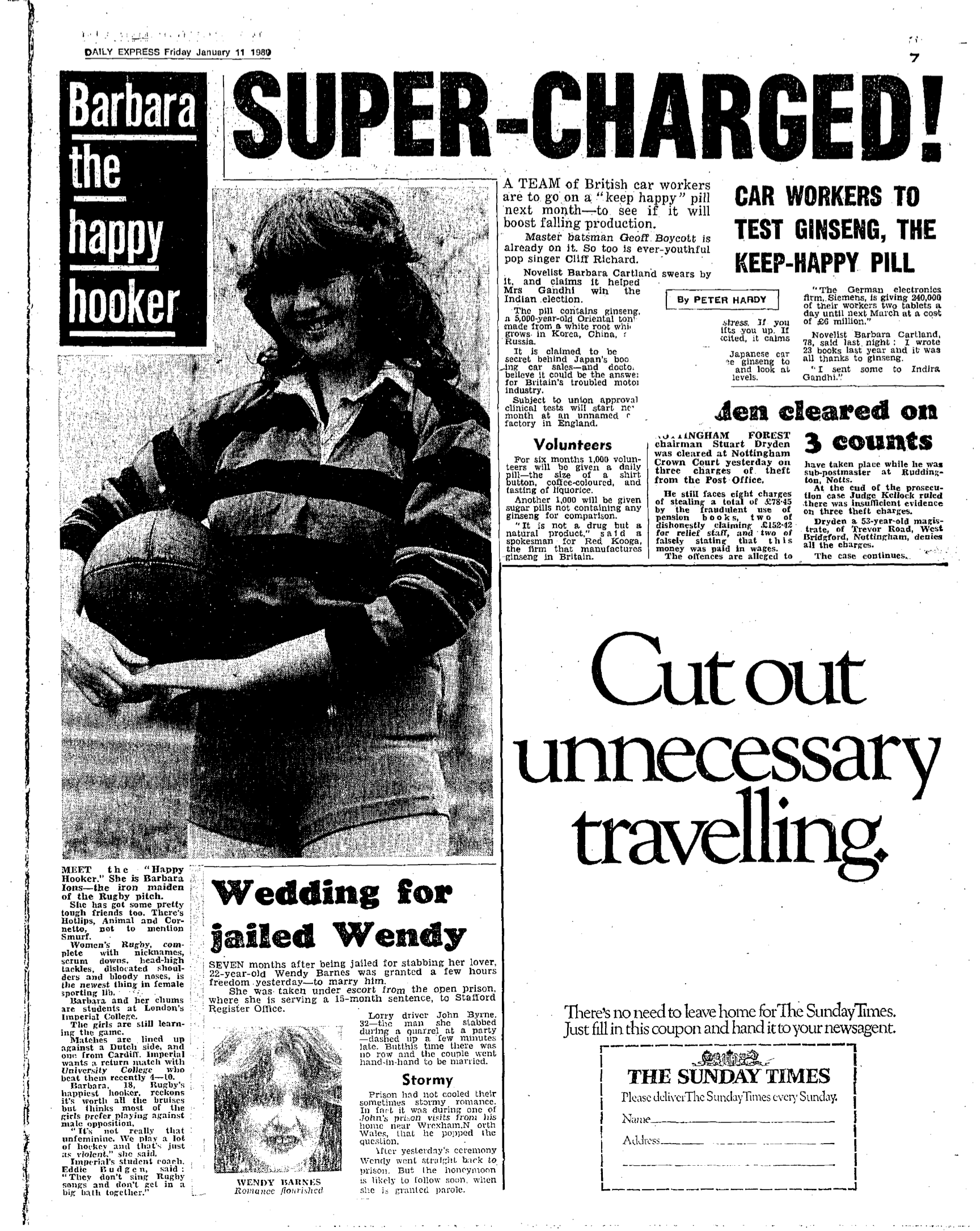
In the same article, Imperial Ladies’ team member Barbara dispels the idea that women aren’t inclined to aggressive sports, which is an idea that Martha nevertheless finds still pervades the sport. She doesn’t understand: “it’s a great outlet for women. Our players find it very cathartic.”
It’s a great outlet for women. Our players find it very cathartic.
Where the game does depend less on physical strength, Martha argues is an advantage that further drives the team’s diversity, explaining “[in women’s rugby] there’s less brutish force and a higher level of skill. You can kind of play wherever you want to on the pitch, whereas with the men’s it’s like who’s the biggest who’s the strongest. But because of the level of skill that we have in the women’s game and the higher priority skill takes, it has a unique advantage really.
She feels this draws women to rugby, as girls rarely play rugby at school, so many new members turn up to ICUWRFC having never played before. “I think what also draws people to women’s rugby is the diversity, acceptance and variation,” Martha explains, adding that it is “also true for body sizes, which is not a lot the case for a lot of sports.”
Despite having featured on national television in what Felix called a “thoroughly entertaining and absorbing match,” the club struggles to draw supporters. Women’s rugby was once again featured in the national press in 2015, though for less positive reasons. This should have been a good year for the club, as they headlined Varsity. However, few people were there to see the College victor over the Medics, as poorly organised travel arrangements made by Sport Imperial meant most supporters deserted the pitch, leaving the team stranded following the game. They felt they had not received the same level of consideration as their male counterparts.
An investigation launched by Imperial supported these claims; the College and Union resolved to further research students’ experiences of sexism in sport at Imperial. The 1752 Group - an organisation dedicated to ending staff sexual misconduct in higher education - felt the investigation “points to an ingrained nature of sexism and misogyny,” as, allegedly, the team were also subject to sexist comments from both Imperial students and Sport Imperial staff.
The club has experienced change since then, telling Felix “we’ve got a really good relationship with Harlington grounds management.” Just this week they christened the club house pitch with its first rugby game.
When they do have observers, they are not always welcome. Martha tells Felix “this season we’ve had men on sidelines catcalling women in games, running onto the pitch, throwing things onto the pitch, and making offensive and inappropriate sexualised comments.”
She knows that rugby culture is at fault here, saying that articles such as that in the Daily Express show where the “negativity and disrespect” the team experience today stems from. She partially blames the amount of drinking within the rugby community, which was also identified as a factor in the 2015 investigation. She knows the abuse is not reflective of the women’s rugby team or their performance at all. However, it mars their experience.
Whilst she notes that this was never from Imperial men, she feels that there is still a “shirking of responsibility” within the community and would appreciate the men’s club “starting the conversation,” suggesting “a clear statement on supporters’ behaviour would be good, and a no tolerance policy.”
Nevertheless, the club is looking forward to TCV. It would seem Imperial’s rivalry with UCL has been replaced by a new rivalry with LSE, and TCV will see both the women’s and men’s teams play in front of a crowd of 1000.
For ICUWRFC, TCV is “the highlight of the year,” as Martha tells Felix “We get the most amount of spectators.” Having been, I know personally that there is still a large difference in the number of spectators for the men’s and the women’s games, but Martha acknowledges that this is symptomatic of a wider issue in women’s rugby, saying “I’ve been to double headers with the, you know, Barbarians and the discrepancy in crowd sizes is ridiculous for that as well. So it’s not like it’s an us issue. It’s a women’s rugby issue.”
She enjoys working with the men’s club and appreciates the support her club receives from them, as the men’s club do the majority of the event organisation. In future, she hopes to work more across the clubs, saying “I’d rather have unity.”
Despite the still prevalent issues, ICURWFC has a positive outlook. Martha tells me “Grassroots women’s rugby is really on the rise – the increase in numbers has been amazing. We’ve got the World Cup on the way and we’re feeling really positive.”
We're feeling really positive.
She knows that with this momentum gain there will be new problems ahead, saying “there’s only so far you can go and I’m just anticipating the glass ceiling. Hence she hopes that she can foster future collaboration between the men’s and women’s clubs, hoping ICURFC will “go above the norm to say ‘we support our women’s club, and we demand respect for them from the sidelines.’”
She doesn’t want to dwell on the Daily Express article, but Martha has one final protest: “We do sing rugby songs."

